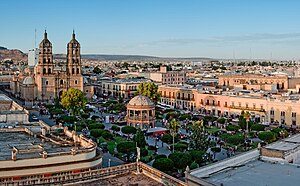Durango (city)
| Victoria de Durango | |
|---|---|
| City | |
| City of Durango | |

Panoramic view
|
|
| Nickname(s): Tierra del Cine (Movie Land) | |
 Location of Durango within the State |
|
| Location in Mexico | |
| Coordinates: 24°01′N 104°40′W / 24.017°N 104.667°WCoordinates: 24°01′N 104°40′W / 24.017°N 104.667°W | |
| Country | Mexico |
| State | Durango |
| Municipality | Durango |
| Founded | July 8, 1563 |
| Founded by | Francisco de Ibarra |
| Government | |
| • Mayor | José Ramón Enríquez Herrera |
| Elevation | 1,880 m (6,170 ft) |
| Population (2010) | |
| • Total | 518,709 |
| • Demonym | Duranguense/Durangueño |
| Time zone | CST (UTC−6) |
| • Summer (DST) | CDT (UTC−5) |
| Website | http://www.municipiodurango.gob.mx/ |
Durango, officially Victoria de Durango and also known as Ciudad de Durango, is the capital and largest city of the Mexican state of Durango. It stands at an altitude of 1,880 metres (6,168 feet).
The city was founded on July 8, 1563, by the Spanish Basque explorer Francisco de Ibarra. During the Spanish colonial era the city was the capital of the Nueva Vizcaya province of New Spain, which consisted mostly of the present day states of Durango and Chihuahua.
In 2010, the city had a population of 518,709, up from 463,830 in 2005. It is the municipal seat of Durango Municipality which had a population of 582,267 in 2010. The municipality has a relatively large land area of 10,041 square kilometres (3,877 square miles) and includes outlying communities such as El Nayar and Cinco de Mayo.
The city of Durango was built on a wide valley in which a primitive Spanish village named Nombre de Dios was founded. By the 16th century, the first conquerors who crossed through its territory were Cristobal de Oñate, José Angulo and Gines Vazquez del Mercado, the latter attracted by the illusion of the existence of a large supply of silver; he had ultimately discovered a special deposit of iron, which now bears his name. In 1562 Don Francisco de Ibarra, the son of one of the celebrated founders of Zacatecas, explored the region and founded the Villa de Guadiana, near the old settlement of Nombre de Dios which soon became known as the Nueva Vizcaya in memory of the western Basque area he was originating from, then called Biscay. Due to untamed territory and also to prevent a reduction in population, Ibarra bought a mine that offered the Indigenous peoples and the Spanish explorers work, with the sole condition that they in turn would settle in the new-founded city.
...
Wikipedia

